Nursing Students Join the Front Lines to Fight COVID-19
The first line of defense against COVID-19 at USC Verdugo Hills Hospital is often CSUN nursing student Sam Sherry.
Working alongside registered nurses as part of their clinical rotations, Sherry and his classmates in CSUN’s Accelerated Bachelor of Science in Nursing program have served as screeners at the non-emergency entrances, making sure employees and occasional visitors show no obvious COVID-19 symptoms as they enter.
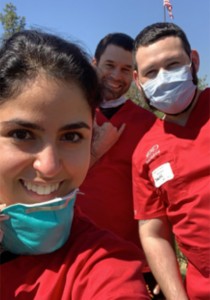
CSUN nursing students Sam Sherry and Rodolfo “Rudy” Alvarado.
Wearing a mask and gloves, he takes everyone’s temperature and asks a few short questions to check for symptoms including: Do you have a new or worsening cough, or shortness of breath, or new loss of taste or smell? If they answer “yes” or present with a fever of 100 or greater, they’re instructed to seek medical attention.
The job’s not particularly glamorous, but it plays a critical role in assuring the wellness of care providers before providing direct patient care. To date, no employees of USC Verdugo Hills Hospital have contracted COVID-19, largely due to diligent efforts to ensure all employees and students have the appropriate personal protective equipment (PPE). Nonetheless, the risk remains high. For Sherry, a first-year nursing student, this is what he signed up for.
“All hands on deck,” he said. “There’s never such a thing as too many people to help out.”
As hospitals shifted their focus and resources in recent weeks to face a surge of COVID-19 patients, CSUN nursing students have been enlisted for shifts to help fortify the community’s response.
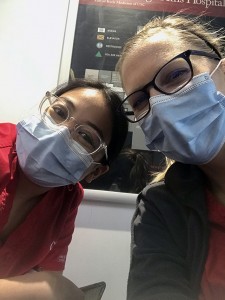
Joyce Arnaldo (L) and Laura Schoonover (R) at USC Verdugo Hills.
For the past few weeks, CSUN students have fulfilled their required clinical hours by conducting these screenings and assisting nurses with a variety of tasks at USC Verdugo Hills Hospital and Children’s Hospital Los Angeles. On Saturday, students also started helping El Monte Hospital and the Los Angeles County Department of Public Health administer COVID-19 drive-through testing, said Rebekah Child, chair of the CSUN Department of Nursing. About 60 CSUN nursing students are assisting at the various sites.
“It’s a tremendous help and a lovely partnership,” said Leah Korkis, USC Verdugo Hills Hospital interim manager of clinical education and nursing excellence, who developed the hospital’s Care Extender program. “The professionalism and the enthusiasm of the students is greatly appreciated. They are our future and they are demonstrating their commitment to the wellbeing of patients and healthcare professionals by partnering with us during these unprecedented times.”
New roles
Some CSUN nursing students are also working as assistants, respiratory therapists, nurse’s aids, emergency medical technicians (EMTs) and other roles at various hospitals. Some of them were reassigned to different departments to perform screening and other support duties.
At USC Verdugo Hills, Care Extender students are asked not to go into high-risk rooms such as those holding confirmed or suspected COVID-19 patients, regardless they are provided clean PPE while in the hospital. They also assist the nurses who treat these patients in a number of ways. For example, if a nurse in a room with a high-risk patient forgets some key piece of equipment, a student from outside the room can bring the appropriate item and pass it through the door using the “tip to tail method,” avoiding contact.
In moments when a COVID-19 patient takes a turn, students can be the calm set of eyes to ensure the nurse has correctly donned all necessary clean PPE before rushing in, Korkis said.
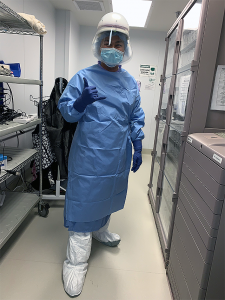
Jorriel Malabanan in protective gear at CSUN nursing student. Malabanan had been working as an operating room assistant.
When patients with coronavirus are transported through designated routes in the hospital, students can open doors and press elevator buttons to eliminate the nurses’ interaction with the environment, and not come into contact with the patient or potentially contaminated equipment, Korkis said.
The students said the days feel mostly normal, but patient loads are down as people stay home and elective procedures are canceled, making the hospitals feel strangely empty. And the protective measures hospitals must take can be jarring. Little precautions hint at something major: Melissa Snell, a second-year nursing student who works as a nursing assistant at Children’s Hospital Los Angeles, said staff members wear masks all the time now, and the cafeteria had to remove high-risk areas for the communal spread of germs, such as the salad bar.
“The hospital has taken precautions to help with the social distancing of the visitors and staff throughout the entire hospital,” Snell said. “It helps keep everyone safe and prevent the spread of germs, so it’s really nice they are making such an effort for all of our safety. It’s not as lively as it once was, for good reason to promote a safe environment, but it definitely is an eerie feeling.”
It was initially nerve-wracking to work in an environment that attracts infected patients, said Jorriel Malabanan, a second-year CSUN nursing student. Malabanan had been working as an operating room assistant at Providence Holy Cross Medical Center. Now, he’s been pressed into service in other parts of the hospital, doing employee health screenings similar to some of his fellow CSUN nursing students.
“The pace is a little bit different,” Malabanan said. “The intensity and the restrictions throughout the hospital are a little bit different. At first, I was kind of nervous to go to work or pick up shifts, but then I realized that our hospital does a good job of providing good, proper PPE.”
An uncertain future
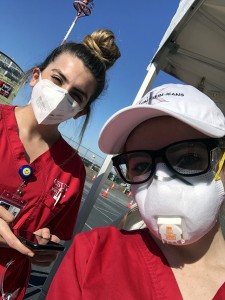
Nina Amirian (L) and Ariel Dankner (R) at the El Monte COVID-19 drive-through testing site.
The students are pitching in just when they are needed most — and just when their futures became unclear.
In CSUN’s Accelerated Bachelor of Science in Nursing Program, students get a mix of classroom and clinical work to prepare for the National Council Licensing Examination to become registered nurses. Students in the accelerated program can complete their degrees more quickly because they already have completed a bachelor’s degree in another field and taken prerequisites.
But licensing tests have been canceled as a social distancing measure, creating a backlog that could impact students’ ability to get licensed in coming months. And in a dispiriting irony, the overall decline in patients means that at the moment health care workers are needed most, many of them are facing reduced hours. Although Child believes hospital operations will eventually return to normal, if the lockdown continues for a few months, the students wonder what the job market will look like.
“I’m scared people aren’t going to hire new nurses,” said second-year nursing student Cindy Lopez.
At the start of the crisis, many hospitals discontinued the use of students on clinical rotations — the primary component of rotations is job shadowing, which isn’t ideal during a time of social distancing. Additionally, the more people on the job, the more PPE is required, so sending students home helped conserve scarce resources such as masks and gloves.
This also left many of CSUN’s students without the 910 hours California requires for nursing students to work in clinical settings. California recently reduced these requirements in favor of simulations, which helped, but didn’t completely solve the problem, as half of all clinical hours still must be conducted on site.
CSUN helps its students
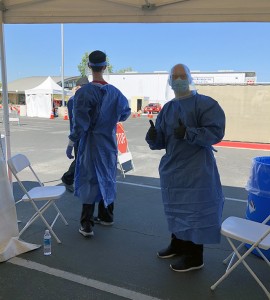
Loren Fung and Eric Blum in what fellow students referred to as “bubble-people PPE” at the El Monte drive-through COVID-19 testing site.
CSUN’s nursing program administrators worked their contacts and employed creativity to help their students in these challenging circumstances. Child reached out to hospitals in the area — and at least one hospital reached out to her — to find opportunities for her students to continue to contribute and log any remaining clinical training hours they need.
CSUN also supplied its students with the extra PPE students usually use to practice in class. This way, students can work without digging into each hospital’s individual stash, which has been in short supply around the country.
“Our program has been very supportive in terms of our needs,” Malabanan said. “I’m really appreciative of their flexibility in assisting us remotely through our program, especially right now as we’re finishing.”
Child also continues to refer students to additional paid opportunities to screen employees at essential businesses.
Lopez, who had completed her clinical hours earlier in the semester, now takes night shifts to screen employees at the Budweiser brewery in Van Nuys. As a screener, she is outfitted with multiple layers of PPE, and although it isn’t hospital work, she feels glad to have found another way to help the community.
“These employees continue to have to work,” Lopez said. “Budweiser is also making hand sanitizer. We’re helping their workers stay safe in the process of contributing to the community, which is good.”
Similarly, Sherry said the pandemic has reinforced the importance of nursing work and his commitment to it.
“I’m happy to have the opportunity to learn,” Sherry said. “That’s how we students should be looking at it, as an opportunity. I don’t want to minimize the risk, as it is very real. But as a nurse, helping sick people is what you do. I welcome and appreciate each day I get to do what I can to help.”

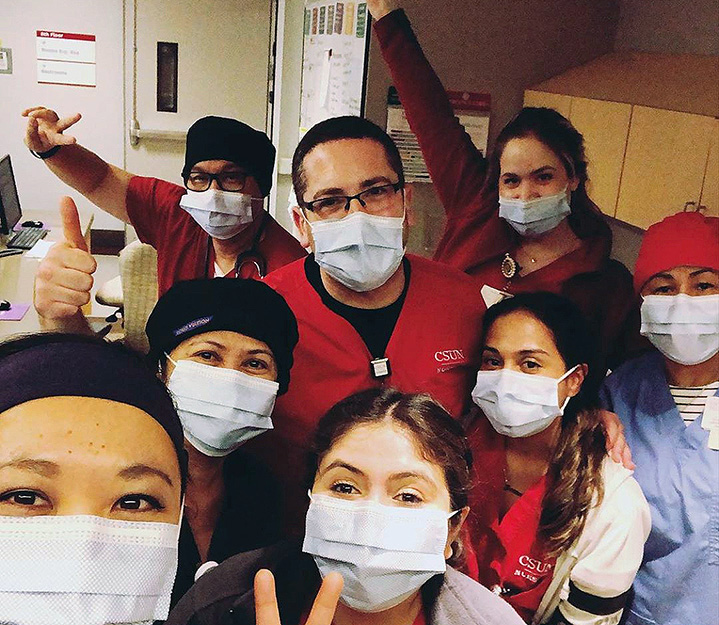
 experience
experience